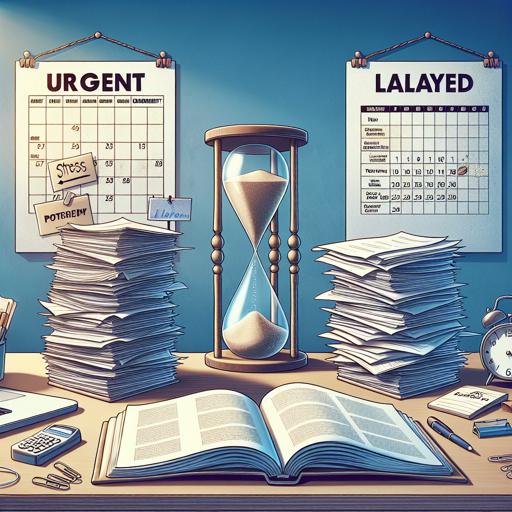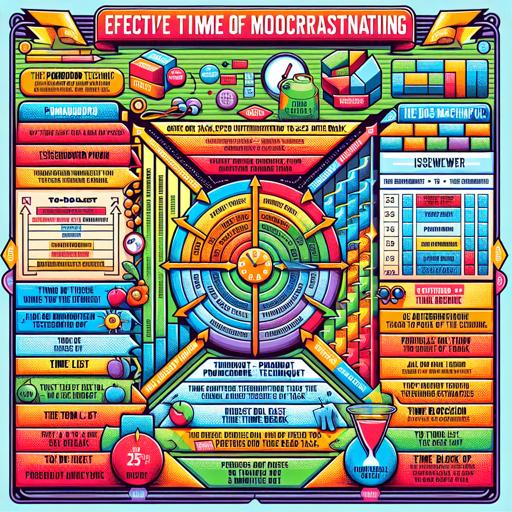Procrastination is a common hurdle that many individuals face in their daily lives, often hindering productivity and personal growth. The art of overcoming procrastination is not just about time management; it’s about understanding the underlying causes that lead us to delay important tasks. Whether it’s the fear of failure, a lack of motivation, or simply feeling overwhelmed, addressing these root issues is crucial.
In this blog, we will explore effective strategies and techniques to conquer procrastination, enabling you to regain control over your time and achieve your goals with renewed focus and determination.
Understanding the root causes of procrastination

Procrastination is like the cunning salesperson we never invited in, peddling the sweet illusion of ease today for sky-high interest tomorrow. Unraveling the complex tapestry that binds us to this artful dodger reveals a surprising tapestry of psychological threads. Often, it masquerades as a time management issue, but at its core, procrastination is deeply entwined with emotional regulation.
Fear of failure, overwhelmed decision-making, or even the seductive comfort of familiar inefficiencies can anchor us to inaction. Imagine a writer staring at a blank page, seized by the specter of inadequacy.
The keyboard beckons, yet, the pull of checking email—or, perhaps, reorganizing the pantry—seems irresistibly justified. Understanding this psychological dynamic is the first stitch in weaving a strategy to reclaim lost time. Harnessing the energy from this revelation into momentum for overcoming the relentless slide of procrastination requires a multifaceted toolset.
Here, self-awareness acts as the North Star on your productivity journey. Recognizing the emotional barriers at play enables strategic pivots—subtly shifting from avoidance to approach goals.
For instance, transforming the daunting task of writing into smaller, manageable tasks can shatter the paralyzing myth of perfection. Psychologists advocate techniques like the Pomodoro Technique, where focused bursts of work are interspersed with planned breaks. This not only bolsters efficiency but channels satisfaction from incremental accomplishments.
By reworking one’s environment to minimize distractions, coupled with a dash of digital discipline, one can orchestrate a symphony of productivity that turns procrastination from foe to myth. This journey isn’t about ruthlessly chronicling every tick on the to-do list; it’s about understanding and mastering the narratives that bind us to inertia.
Learning to dance with deadlines and take proactive steps in untangling the puppet strings of procrastination charts a brighter course. Each day offers a fresh canvas to paint productivity anew, rewriting scripts of hesitation with brushstrokes of intentional action. In essence, the most meaningful weapon against procrastination is not vanquishing it but orchestrating a mindset shift that crafts a harmonious balance between action and intention.
Effective time management techniques to combat procrastination

In the bustling symphony of modern life, procrastination often performs as the unwelcome soloist, stunning us into inactivity when we can least afford it. Effective strategies for managing our time can serve as the maestro conducting productivity back into our lives.
Imagine your to-do list not as a tyrant but as a loyal confidant; time management is the communicator that builds this harmonious relationship. The first step in overcoming procrastination is to break daunting tasks into deliciously bite-sized morsels, turning the overwhelming mountain of responsibility into a range of manageable hills. By applying techniques such as setting specific, measurable goals and prioritizing tasks, we lay the groundwork for an efficient, action-oriented day.
These methods transform procrastination from a paralyzing force into a manageable aspect of one’s daily routine, leading to progress and, eventually, achievement. In the realm of harnessing time management’s full potential, tools such as the Pomodoro Technique provide a structured rhythm to productivity. Picture this: working in focused segments of time, typically 25 minutes, punctuated by short, rejuvenating breaks—it’s as if your workday is infused with energizing sprints rather than an unbearable marathon.
This technique not only enhances concentration but also keeps procrastination at bay by splitting our attention into manageable intervals. Additionally, leveraging digital tools tailored for organization and productivity can fortify your crusade against procrastination.
From apps that banish distractions to planners that track progress, these resources help keep the mind from straying into unproductive pastures. Anchoring one’s efforts in these effective time management practices not only combats procrastination but transforms it into the momentum needed for success. The battle against procrastination is akin to a finely-strategized chess game, with each move requiring forethought and precision.
Implementing time management techniques as your logical tactics ensures each piece of your schedule falls perfectly into place, orchestrating a victory over delays and disruptions. The outcome is not just a completion of tasks but the rewarding build-up of a proactive habit—one that promotes a sense of control and achievement.
Within this strategic framework, procrastination loses its grip, unable to thrive in an environment filled with purposeful action and time well spent. By mastering these techniques, you redefine your relationship with time, crafting not just productive days but a fulfilling, balanced life, unburdened by the specter of procrastination.
The role of mindset and motivation in overcoming procrastination

Embarking upon the odyssey of overcoming the notorious act of postponement, one might find the interplay of mindset and motivation as the essential duo in this dramatic tale. It’s like entering a grand library, where the aisles are filled with past tasks collecting dust, each a monument to dilly-dallying decisions. Here stands the mindset, the lens through which one interprets the labyrinth of work ahead.
A fixed mindset whispers temptations, painting adversity as an insurmountable foe, suggesting that tasks are better left for tomorrow. Conversely, a growth mindset, like a wise sage, invites us to relish challenges as opportunities to polish our skills, armed with the belief that effort is the artist that shapes our abilities.
It’s in this transition from limitation to possibility where the battle against procrastination is either won or lost. Coupled with the evolving narrative of mindset, motivation strides in like a charismatic protagonist, wielding the stirring call of purpose. Just imagine the difference motivation makes; a potent blend of intrinsic desires, where passion drives progress, teamed with a sprinkle of external motivations such as looming deadlines or the alluring promise of a future reward.
This dynamic duo advocates for small victories to be celebrated—a testament to moving the plot forward, like finding hidden treasures within mundanity. Strategies such as setting clear, achievable goals or transforming overwhelming tasks into digestible segments become the swords and shields against stagnation.
These methods light the flames under even the most stubborn feet, converting intentions into actionable plans. As the saga unfolds, the harmonious balance of a refined mindset and motivational backing becomes the guiding compass. The aspirant who dares to face inner resistance with these tools finds themselves navigating toward not just productivity, but also a more fulfilled existence.
The transformation from a world colored by procrastination to one painted with the hues of accomplishment is not just a possibility, but an invitation to rewrite the narrative into one of extraordinary, self-driven success. Our story closes on the note that with the right mindset and motivating factors, time is no longer the tyrant it appears to be, but rather an arena where the bold achieve mastery over their procrastinating dragons.
Practical tools and apps to help you stay focused
Navigating the turbulent waters of distraction can often feel like steering a leaky boat through a sea of tantalizing diversions. However, a radar of practical tools and imaginative apps can serve as your trusty navigation guide to deliver you safely to the shores of productivity.
In the quest to outmaneuver procrastination, reimagining one’s technology stack can turn your digital devices from procrastination enablers into productivity powerhouses. Take the much-lauded Focus@Will, for instance—this app doesn’t just play music; it curates scientifically-engineered soundtracks designed to enhance concentration, allowing you to channel your inner Mozart, regardless of your task. Or consider RescueTime, a clever app that discreetly tracks your time and online activities, offering enlightening insights into your daily habits and where your precious minutes vanish like socks in a laundry machine.
Of course, not all heroes wear capes; some wear minimalist designs and lurk innocently on your phone, waiting to be unleashed in times of need. The ingenious app Forest, for instance, rewards you with virtual trees for maintaining focus, cultivating a digital forest of productivity with every session completed successfully.
Meanwhile, the Pomodoro Technique app elegantly divides your work into manageable spurts, punctuated by ticking breaks, transforming an overwhelming task into chewable bites. Just like a magician pulls endless scarves out of a hat, these applications pull time from the depths of procrastination, offering an enchanting illusion where hours expand and work flows seamlessly. In these modern times, where the most enticing entertainment is just a click away, it is imperative to not only recognize the fertile battleground where procrastination breeds but also to arm oneself with the right arsenal.
Ignoring the distractions waving gleefully at every notification is no small feat, yet with the right tools, the seemingly endless swell of impending deadlines becomes a surmountable hill rather than an insurmountable mountain. Integrating these innovative applications into your daily routine not only bolsters your productivity but also ensures that your journey through the tangled web of distractions is both efficient and remarkably rewarding.
Let these tools be the anchor that steadies your ship and guides you towards the satisfying horizon of a to-do list conquered.
Building sustainable habits for long-term success
The silent saboteur of our finest goals is not always the daunting challenge of the task at hand, but often the creeping habit of putting off those tasks until tomorrow. Addressing this foe with a strategic playbook for lasting change holds the key to transforming ambitions into achievements. Building a fortress of enduring practices begins with the art of conquering delay; embrace, not evade.
The crux lies in understanding procrastination as not merely a lack of time management, but a psychological aversion to complexity or feared failure. To dismantle this obstacle, the journey starts with breaking overwhelming goals into manageable, delightfully achievable steps.
By cultivating the mindset that each step forward, however small, is a victory worthy of acknowledgment, one begins to conditionedly ally with productivity. Incorporating rituals that intertwine both seriousness and levity can foster an environment where diligence meets enjoyment, thus propelling sustainable change. Remembering the significance of embedding habits that elicit a sense of reward for effort is crucial.
For instance, juxtaposing focused work intervals with brief leisure breaks can make the act of finishing a chore not only desirable but eagerly anticipated. The trick is finding a rhythm that harmonizes all efforts—where the to-do list dances alongside efficiency and purpose, not just an endless arrangement of impending duties.
The charm stitched into these simple yet potent practices is their ripple effect, influencing an enduring inclination toward consistent action, sweeping away excuses with an intrepid stride toward long-term accomplishments. Fostering mechanisms that reinforce progress without judgment lays the groundwork for a feedback loop rich in self-efficacy.
Celebrate incremental wins as deeply as you do monumental milestones, for they construct a scaffold capable of supporting more significant aspirations. Through this meticulous crafting of behavior and perspective—each brick of habit laid with intent, shaded slightly with humor—the fortress against procrastination stands resilient. Ultimately, it is in this artful blending of resolve and light-heartedness, determination and delight, that habits are not just formed, but fortified for life’s ever-changing terrain.
Nasza rekomendacja wideo
Podsumowanie
Overcoming procrastination involves understanding its root causes, setting clear goals, and implementing effective time management strategies. By breaking tasks into smaller steps, eliminating distractions, and using tools like timers or to-do lists, individuals can enhance productivity.
Cultivating self-discipline and rewarding progress are also crucial in maintaining motivation and developing healthier work habits.
Najczęściej zadawane pytania
What are the common psychological reasons behind procrastination, and how can understanding them help in overcoming it?
Common psychological reasons behind procrastination include fear of failure, perfectionism, and lack of motivation, and understanding these can help in overcoming procrastination by allowing individuals to address the underlying emotions and develop targeted strategies for improvement.
Sure, please provide the question you’d like me to answer.
How can setting specific goals and deadlines effectively reduce procrastination in both personal and professional settings?
Setting specific goals and deadlines can effectively reduce procrastination by providing clear targets and a sense of urgency, which helps prioritize tasks and maintain focus.
Sure, please provide the question you’d like me to answer.
What role does time management play in overcoming procrastination, and what are some practical techniques to improve it?
Time management plays a crucial role in overcoming procrastination by helping individuals prioritize tasks and allocate specific time slots for their completion; practical techniques to improve it include setting clear goals, using tools like calendars or to-do lists, breaking tasks into smaller steps, and implementing the Pomodoro Technique to maintain focus and productivity.
Sure, please provide the question you’d like me to answer.
How can mindfulness and self-awareness contribute to recognizing and combating procrastination habits?
Mindfulness and self-awareness can help recognize and combat procrastination by enabling individuals to identify underlying triggers and patterns, allowing for more intentional and focused action.
Of course! Please provide the question you’d like me to answer.
What are some effective strategies for overcoming procrastination when working on long-term projects or goals?
Effective strategies for overcoming procrastination on long-term projects include breaking tasks into smaller, manageable steps, setting specific deadlines, using time management techniques like the Pomodoro Technique, and maintaining accountability through regular progress check-ins.
Of course! Please provide the question you’d like answered.
How can technology be both a hindrance and a help in dealing with procrastination, and what tools can be used to stay focused?
Technology can be both a hindrance and a help in dealing with procrastination by providing distractions like social media while also offering productivity tools like time management apps (e.g., Todoist, Trello) and focus-enhancing applications (e.g., Forest, Focus@Will) to help maintain concentration.
